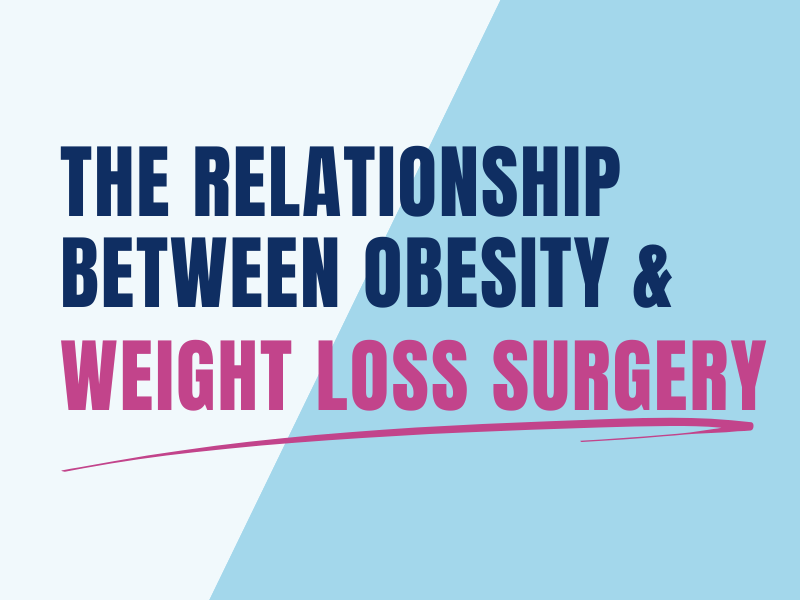The relationship between obesity & weight loss surgery

Reviewed By Senior Bariatric Surgeon Igors Troickis
Last updated 01/01/2000
The relationship between obesity & weight loss surgery
 |
Reviewed By Senior Bariatric Surgeon Igors Troickis Last updated 01/01/01 |
Obesity has become a significant health concern affecting millions of people globally. Recognised as a disease, obesity poses serious health risks and can lead to various complications such as type 2 diabetes, heart disease, and hypertension. Weight loss surgery has emerged as a proven and effective solution for combating obesity. It offers a sustainable way to achieve significant weight loss, improve overall health, and reduce the risk of obesity-related diseases, making it one of the best approaches for those struggling with long-term obesity.

How do we define obesity?
Obesity is a medical condition characterised by excessive accumulation of body fat that can negatively affect an individual’s health. It is usually diagnosed using the body mass index (BMI), which is a measure of body fat based on a person’s height and weight.
BMI is calculated by dividing a person’s weight in kilograms by the square of their height in metres. A BMI of 30 or above is considered obese, while a BMI of 25 to 29.9 is considered overweight.
Obesity can have several negative effects on an individual’s health, including:
- Increased risk of chronic diseases: Obesity is associated with an increased risk of developing chronic diseases such as type 2 diabetes, heart disease, stroke, high blood pressure, and some types of cancer.
- Increased strain on joints: Excess weight can put added strain on the joints, increasing the risk of joint problems, such as osteoarthritis.
- Respiratory problems: Obesity can lead to respiratory problems, including sleep apnea, asthma, and shortness of breath.
- Mental health issues: Obesity can also have negative effects on mental health, including depression, anxiety, and low self-esteem.
- Reduced life expectancy: Obesity can reduce life expectancy by several years.
The effects of obesity can be mitigated through lifestyle changes, including regular exercise, healthy eating habits, and weight management. In some cases, weight loss surgery may be recommended for individuals with severe obesity to help them lose weight for the long term and improve their overall health.
 |
Get our best content in your inbox every week
|

in your inbox every week
Is Obesity a disease?
Increasingly many medical organisations, including the World Health Organization (WHO), recognise obesity as a disease:
‘Obesity is a complex disease that presents a risk to health. Its causes are much more complex than the mere combination of an unhealthy diet and physical inactivity.’ The World Health Organisation 2022
Obesity is a chronic medical condition characterised by excessive accumulation of body fat that can negatively affect an individual’s health. It is associated with an increased risk of several chronic diseases, including type 2 diabetes, heart disease, stroke, high blood pressure, and some types of cancer.
Classifying obesity as a disease helps to increase awareness and understanding of the condition and highlights the importance of prevention and treatment. It also helps to remove the stigma associated with obesity, as it is recognised as a medical condition rather than a personal failing or lack of willpower.
By recognising obesity as a disease, healthcare professionals can work with patients to develop personalised treatment plans that address the underlying causes of their condition, including lifestyle factors, medical conditions, and genetic factors.
What causes obesity?
There are several factors that can contribute to the development of obesity. These include:
Genetics: Genetics can play a role in the development of obesity. Research has shown that some people may have a genetic predisposition to obesity, which can affect their metabolism, hormones, and other factors that influence weight gain.
Poor diet: Consuming a diet high in calories, unhealthy fats, and added sugars can lead to weight gain and obesity. Eating a diet that is high in processed foods, fast food, and sugary drinks can contribute to an increase in calorie intake and weight gain.
Lack of physical activity: A sedentary lifestyle, with little or no physical activity, can contribute to weight gain and obesity. When a person does not burn enough calories through physical activity, those calories are stored as fat, leading to weight gain.
Environmental factors: Environmental factors such as living in an area with limited access to healthy food options, lack of safe and convenient places to exercise, and a culture that promotes sedentary lifestyles can all contribute to the development of obesity.
Medical conditions: Some medical conditions, such as hypothyroidism, Cushing’s syndrome, and polycystic ovary syndrome (PCOS) can contribute to weight gain and obesity.
Medications: Certain medications, such as antidepressants, antipsychotics, and corticosteroids, can lead to weight gain as a side effect.
Obesity is often the result of a complex interplay between these factors, and multiple factors can contribute to the development of the condition. Addressing these underlying factors is key to the prevention and treatment of obesity.
Is Obesity a disease?
Increasingly many medical organisations, including the World Health Organization (WHO), recognise obesity as a disease:
‘Obesity is a complex disease that presents a risk to health. Its causes are much more complex than the mere combination of an unhealthy diet and physical inactivity.’ The World Health Organisation 2022
Obesity is a chronic medical condition characterised by excessive accumulation of body fat that can negatively affect an individual’s health. It is associated with an increased risk of several chronic diseases, including type 2 diabetes, heart disease, stroke, high blood pressure, and some types of cancer.
Classifying obesity as a disease helps to increase awareness and understanding of the condition and highlights the importance of prevention and treatment. It also helps to remove the stigma associated with obesity, as it is recognised as a medical condition rather than a personal failing or lack of willpower.
By recognising obesity as a disease, healthcare professionals can work with patients to develop personalised treatment plans that address the underlying causes of their condition, including lifestyle factors, medical conditions, and genetic factors.
What causes obesity?
There are several factors that can contribute to the development of obesity. These include:
Genetics: Genetics can play a role in the development of obesity. Research has shown that some people may have a genetic predisposition to obesity, which can affect their metabolism, hormones, and other factors that influence weight gain.
Poor diet: Consuming a diet high in calories, unhealthy fats, and added sugars can lead to weight gain and obesity. Eating a diet that is high in processed foods, fast food, and sugary drinks can contribute to an increase in calorie intake and weight gain.
Lack of physical activity: A sedentary lifestyle, with little or no physical activity, can contribute to weight gain and obesity. When a person does not burn enough calories through physical activity, those calories are stored as fat, leading to weight gain.
Environmental factors: Environmental factors such as living in an area with limited access to healthy food options, lack of safe and convenient places to exercise, and a culture that promotes sedentary lifestyles can all contribute to the development of obesity.
Medical conditions: Some medical conditions, such as hypothyroidism, Cushing’s syndrome, and polycystic ovary syndrome (PCOS) can contribute to weight gain and obesity.
Medications: Certain medications, such as antidepressants, antipsychotics, and corticosteroids, can lead to weight gain as a side effect.
Obesity is often the result of a complex interplay between these factors, and multiple factors can contribute to the development of the condition. Addressing these underlying factors is key to the prevention and treatment of obesity.
Considering weight loss surgery this year? Find out if you’re eligible and start your journey to a healthier you. |
Considering weight loss surgery this year? Find out if you’re eligible and start your journey to a healthier you.
What is weight loss surgery?
Weight loss surgery, also known as bariatric surgery, is a type of surgical procedure that helps people who are severely overweight or obese to lose weight by altering their digestive system. The surgery is typically performed on individuals who have a body mass index (BMI) of 30 or more and (although not an requirement) also suffer with other health conditions, such as type 2 diabetes, high blood pressure, or sleep apnea.
There are different types of weight loss surgery, including gastric bypass and gastric sleeve. Gastric bypass and gastric sleeve involve reducing the size of the stomach, while gastric banding (a procedure no longer recommended by most surgeons due to their high failure rates) involves placing an adjustable band around the upper part of the stomach to limit food intake.
The benefits of weight loss surgery include significant and sustained weight loss, improvement or resolution of obesity-related health conditions such as type 2 diabetes, high blood pressure, and sleep apnea, and improvement in overall quality of life. In addition to physical health benefits, weight loss surgery can also lead to improved mental health, including increased self-esteem and reduced risk of depression and anxiety.
What are the main types of weight loss procedures?
There are several types of weight loss (bariatric) surgery that are commonly performed. These include:
Gastric sleeve surgery: Also known as sleeve gastrectomy, this surgery involves removing a large portion of the stomach, leaving a narrow tube or sleeve-shaped stomach. This reduces the amount of food that can be eaten at one time and leads to a feeling of fullness and satisfaction with smaller meals.
Gastric bypass surgery: This surgery involves dividing the stomach into a small upper pouch and a larger lower pouch, then rerouting the small intestine to connect to the smaller upper pouch. This restricts the amount of food that can be eaten at one time and reduces the absorption of calories from food.
Mini gastric bypass surgery: The mini gastric bypass is a faster, easier & less complex method of achieving the benefits of standard gastric bypass.Mini Gastric bypass also creates a small stomach pouch but involves a simpler approach. The pouch is connected directly to a loop of the small intestine, bypassing a portion of the stomach and the upper small intestine. There is only one surgical connection.
Weight Loss Riga - Helping you achieve lasting weight loss success
If you're considering bariatric surgery as a route to achieving last weight loss success, take the time to explore the different procedures available and work with your doctor to find the right procedure for you.
At Weight Loss Riga, we pride ourselves on the quality of our bariatric surgeons, dedicated medical team and devoted patient care team.
All of our reviews are genuine, from real people who have had their procedure with us and are proud to be rated “excellent” by 428+ patients on Trustpilot. You can read some of our reviews here.
Book a free consultation with us to speak with a bariatric specialist and we'll guide you through the journey.
What is weight loss surgery?
Weight loss surgery, also known as bariatric surgery, is a type of surgical procedure that helps people who are severely overweight or obese to lose weight by altering their digestive system. The surgery is typically performed on individuals who have a body mass index (BMI) of 30 or more and (although not an requirement) also suffer with other health conditions, such as type 2 diabetes, high blood pressure, or sleep apnea.
There are different types of weight loss surgery, including gastric bypass and gastric sleeve. Gastric bypass and gastric sleeve involve reducing the size of the stomach, while gastric banding (a procedure no longer recommended by most surgeons due to their high failure rates) involves placing an adjustable band around the upper part of the stomach to limit food intake.
The benefits of weight loss surgery include significant and sustained weight loss, improvement or resolution of obesity-related health conditions such as type 2 diabetes, high blood pressure, and sleep apnea, and improvement in overall quality of life. In addition to physical health benefits, weight loss surgery can also lead to improved mental health, including increased self-esteem and reduced risk of depression and anxiety.
What are the main types of weight loss procedures?
There are several types of weight loss (bariatric) surgery that are commonly performed. These include:
Gastric sleeve surgery: Also known as sleeve gastrectomy, this surgery involves removing a large portion of the stomach, leaving a narrow tube or sleeve-shaped stomach. This reduces the amount of food that can be eaten at one time and leads to a feeling of fullness and satisfaction with smaller meals.
Gastric bypass surgery: This surgery involves dividing the stomach into a small upper pouch and a larger lower pouch, then rerouting the small intestine to connect to the smaller upper pouch. This restricts the amount of food that can be eaten at one time and reduces the absorption of calories from food.
Mini gastric bypass surgery: The mini gastric bypass is a faster, easier & less complex method of achieving the benefits of standard gastric bypass.Mini Gastric bypass also creates a small stomach pouch but involves a simpler approach. The pouch is connected directly to a loop of the small intestine, bypassing a portion of the stomach and the upper small intestine. There is only one surgical connection.
Weight Loss Riga - Helping you achieve lasting weight loss success
If you're considering bariatric surgery as a route to achieving last weight loss success, take the time to explore the different procedures available and work with your doctor to find the right procedure for you.
At Weight Loss Riga, we pride ourselves on the quality of our bariatric surgeons, dedicated medical team and devoted patient care team.
All of our reviews are genuine, from real people who have had their procedure with us and are proud to be rated “excellent” by 428+ patients on Trustpilot. You can read some of our reviews here.
Book a free consultation with us to speak with a bariatric specialist and we'll guide you through the journey.
Connect with others on the same journey as you to lasting weight loss success |
Connect with others on the same journey as you to lasting weight loss success
You might also like...
Read more relevant content
Listen to the story of others on the same journey
Listen to the story of others on the same journey

Patient experience | Tilly experience with Weight ...
Tilly lost 13 stone following her surgery with Weight Loss Riga. Listen to her story as she shares insights into her experience pre and post surgery....

Patient review | Hayley’s last ditch effort to l...
Hayley was 18 stone and on the verge of giving up on losing weight before she decided to have weight loss surgery. Find out how her journey’s go...






